The Ukrainian army has recaptured a number of towns around Kharkiv in recent weeks. How are the people who went back there?
Lyuba Minchenko wakes up in the middle of the night, looks out of the small basement window and sees blazing flames. She rubs her eyes, the flames are gone. “I’m going crazy,” she thinks, “I have to get out of here.” At that moment, the 58-year-old felt the hand of her daughter Lada, who noticed that the mother was sitting bolt upright in bed. The two whisper to each other, calm down. “I’m only 20, Mom, I haven’t seen anything yet,” says Lada. «I have to survive. I have to.”
That was at the beginning of March, says the pensioner with the blond hair and the small, warm eyes. In the village of Vilkhivka, 15 kilometers from Kharkiv, Lyuba, her husband Serhi and Lada held out under Russian occupation for almost two weeks. They lived in the basement, rarely moved from there, and only very quietly fetched food and drink from the upper floor during the day.
The enemy soldiers had built several positions around the house. The Ukrainians attacked to retake the place. At the school, barely a kilometer away, Russian soldiers raped a neighbor’s 13-year-old daughter, Lyuba says.
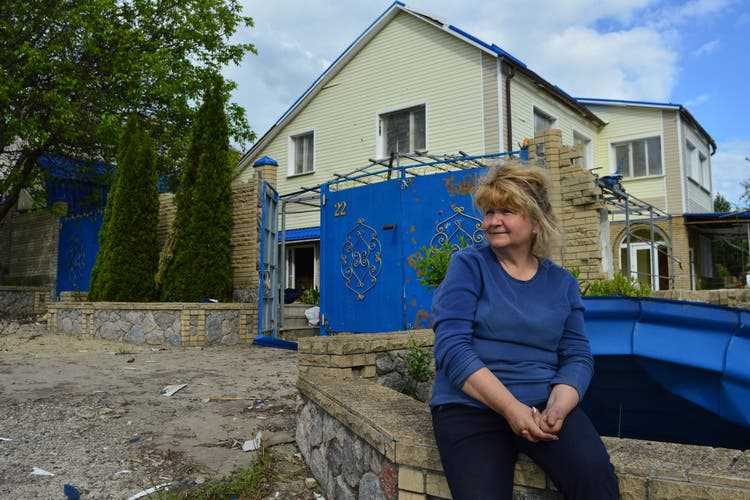
Ljuba sits on the wall in front of her damaged house in Wilchiwka.
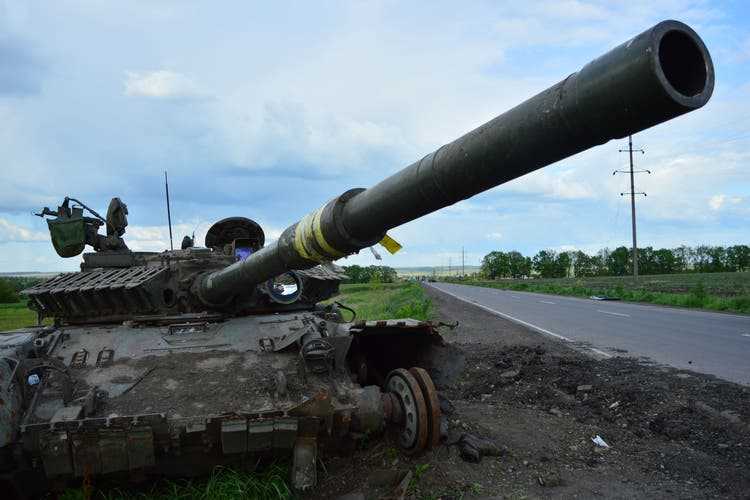
A destroyed tank between Vilkhivka and Kharkiv.
Her life in those days was determined by loneliness – and by fear. The thunder of the guns rolled over the small settlement from all directions. Those who tried to flee were shot by the Russians. The road leading out of town is still littered with the wrecks of civilian cars.
Nevertheless, Ljuba and her family dared to flee and made it. “Somehow, through the night,” she says, “on March 12 or 13.” She could hardly describe the relief she felt when they met the first Ukrainian soldiers. Her husband then went straight to the recruitment office of the Ukrainian army in Kharkiv and has been fighting at the front ever since.
Lyuba returned after the liberation of Vilkhivka. In her absence, her home had been hit three times. There is a meter-deep hole in the ground in front of the barn. Half of the top floor is missing and half of the wall of the garage is missing. The car is no longer there either: someone stole it.
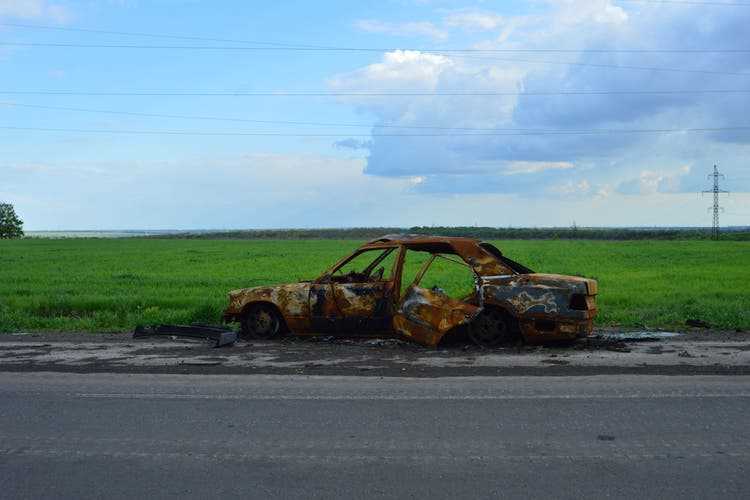
Wrecked car on the road between Vilkhivka and Kharkiv.
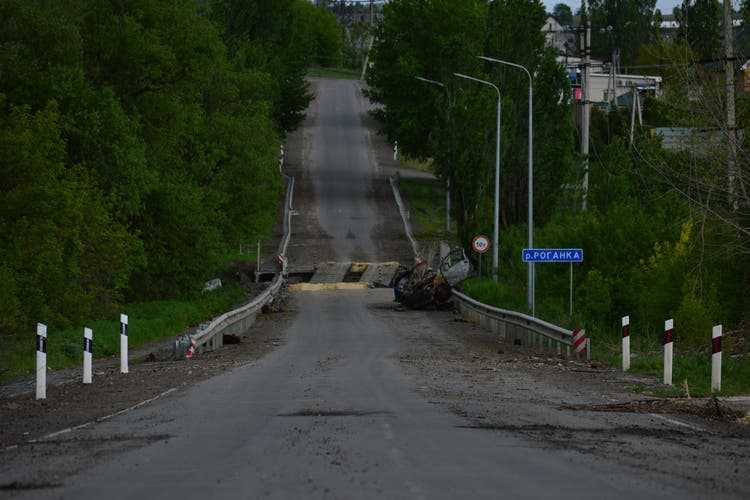
Street scene in the destroyed town of Wilchiwka.
The upstairs bathroom is unrecognizable. The roof is missing, and the floor is littered with rubble and bits of metal, almost artfully bent by the unimaginable heat and violence. Lyuba sobs profusely as she uses the last of her strength to push the remains of the washing machine out of the way to get to where her bedroom once was.
Is the damage from artillery fire? From a rocket? She does not know. It is clear to her, however, that she is only alive if she is lucky. Wiping away her tears, she walks through the garden on this May day, past the walnut tree, roses and tulips. “This was the house of a very happy family,” she says. Her black dog Lime follows her every step.
Speak only in Ukrainian
War has been raging in Ukraine for almost 90 days after the Russian army invaded the country on February 24 under the guise of a so-called “special operation”. Supposedly they wanted to liberate the population and protect it from a “fascist regime” that oppresses and even kills people.
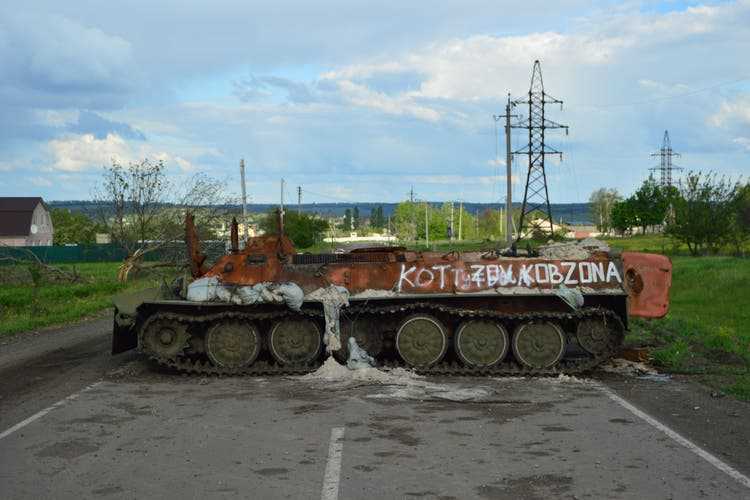
A wrecked Russian military vehicle on a street in Vikhivka.
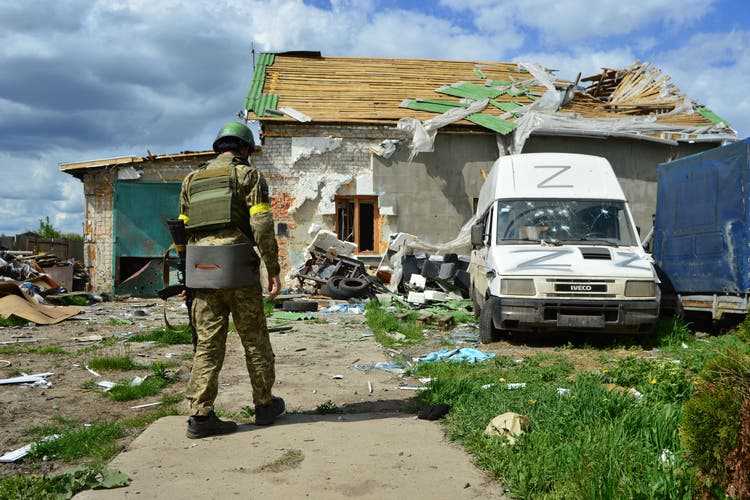
A Ukrainian soldier stands next to a car that has been daubed with three “Z’s” by Russian soldiers. The letter symbolizes the Russian attack.
The reality is different. After the unsuccessful attack on the capital Kyiv, the region around Kharkiv, the country’s second largest city, became the scene of fierce fighting. But despite all the brutality of the attacks, the Russian successes remained limited – the region not only held out, but has also been the scene of a spectacular counter-offensive for a few weeks.
Some of the attackers are now being pushed back to the Russian border. The Ukrainian army is supported by a large number of volunteer fighters, the so-called Territorial Defense Forces. In addition, the originally right-wing extremist Azov regiment, which has become known around the world for its bitter resistance in the southern city of Mariupol, is said to have stationed several thousand fighters in Kharkiv.
With their own special forces, the “Kraken”, they enjoy heroic status in Kharkiv. The troupe’s leadership team is recruited from former football hooligans from the Metallist club. It was also the Azov regiment that liberated Lyuba’s village of Vilkhivka on March 27. The town, in which around 640 people lived before the war, is a vivid example of Russia’s unsuccessful campaign – on a military, but also on a propaganda level.
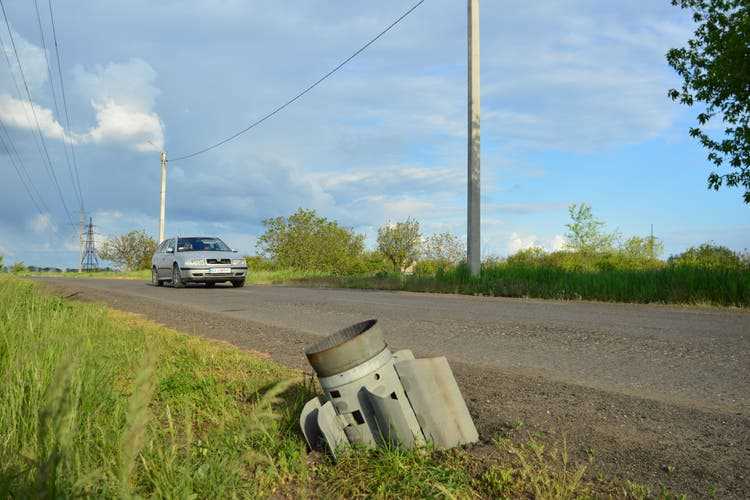
A rocket has penetrated the roadside between Kharkiv and Vilkhivka.
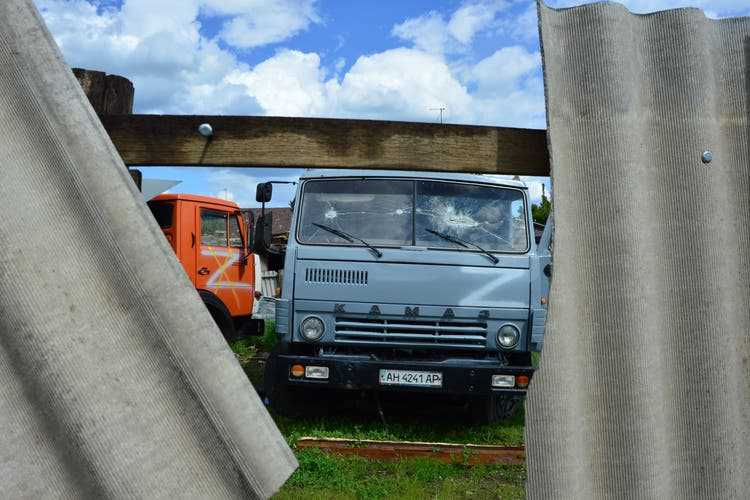
Ruska Losova was recaptured by Ukrainian fighters in mid-May.
Vikhivka is less than 30 kilometers from the border and belongs to that part of Ukraine where there is traditionally a strong Russian influence: culturally, linguistically, but also politically. Before the war, the pro-Russian opposition platform held a fifth of the seats in the Kharkiv city parliament. But Lyuba no longer wants to speak Russian, only Ukrainian. This is despite the fact that she grew up speaking Russian and also has family members in the neighboring country.
“Those are orcs, not humans,” she says. The “Ork” is a green, ugly and aggressive mythical creature from the book series “Lord of the Rings” by the British author Tolkien and is now used as a synonym for “Russian” throughout Ukraine.
The drastic expression is absolutely justified for Ljuba. The war not only destroyed her home, but also tore her entire family apart. She blocked her sister-in-law from Russia on social media. The messages she received from her were too malicious. She reads from her mobile phone: “You are fascists, you are zombies. I’m glad you’re being bombed. I’m glad this happened to you and that you and your family will never travel again.”
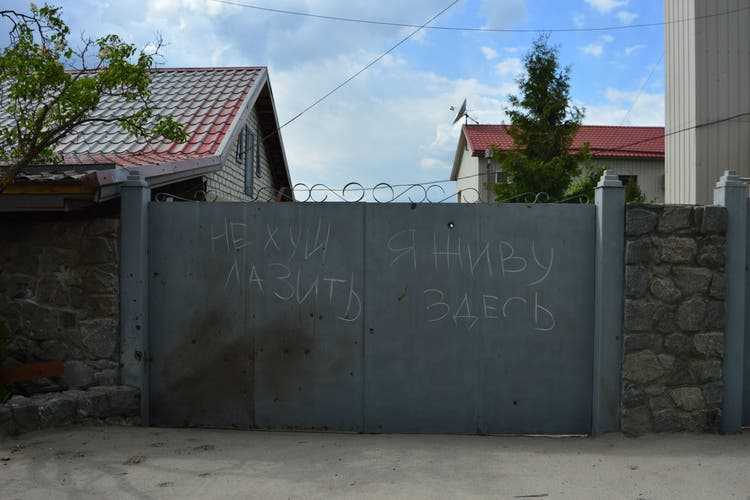
“Piss off, I live here” is written on the front door of this house in Wilchiwka.
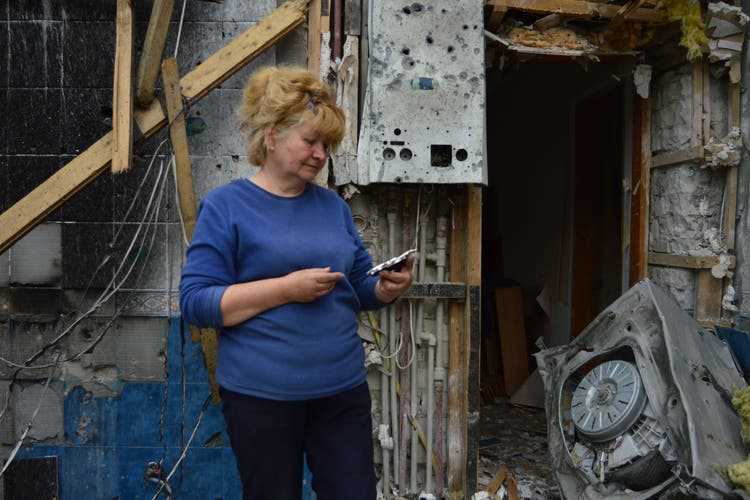
Lyuba is holding a family photo.
A walk through the damaged village shows that Ljuba is not the only one who feels this way. The tracks of the Russian tanks that raced across the field are still visible in front of her house. Your neighbor wrote a clear message to the intruders on his front gate: “Piss off, I live here.”
Despite the recapture, the danger has not been averted
The road leads from the neighboring house to a small lake. Ukrainian engineer units built a temporary bridge over it, the old one had been blown up. Behind it on a small hill stands Marina Vorobeva. She walks through the deserted streets of her homeland. Her daughter is sitting in a small cart: The two of them have collected a few food donations from volunteers who come to town from time to time: apples, bread, canned goods. The shops on the side of the road have been shot to pieces.
With her husband and daughter, Marina has stayed in the village since the beginning of the war. It was very bad among the Russians, she says. The situation is better now, but there is no electricity, no internet, no gas. “At least it’s not that cold anymore,” she says, shrugging. Her daughter sits quietly in the wheelbarrow and smiles. “She hardly speaks,” says Marina, “since the bombs, all the loud noises.”
The two start their way home over the gray asphalt. Then Marina turns around again: She misses her sister’s son. His name is Andrei, he is 19 years old and disappeared during the five-week Russian occupation. If you hear anything from him, please write to her on Facebook. “At some point there will be electricity again, then I’ll turn on my cell phone and hopefully have good news from him,” she says, more to herself.
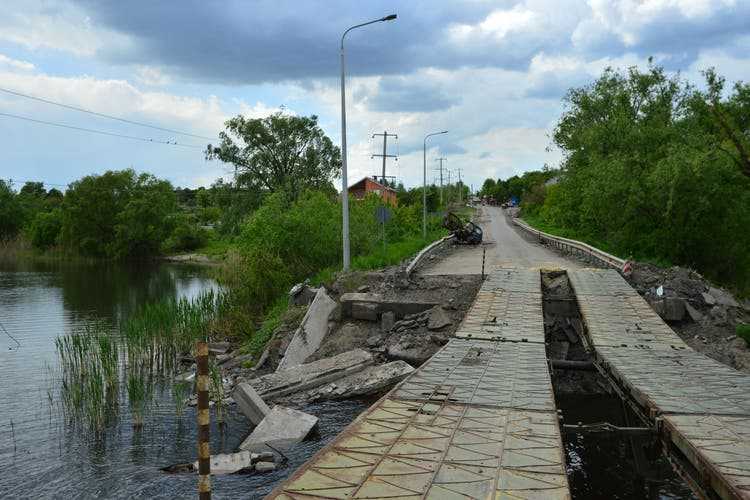
Makeshift bridge in Wilchiwka.
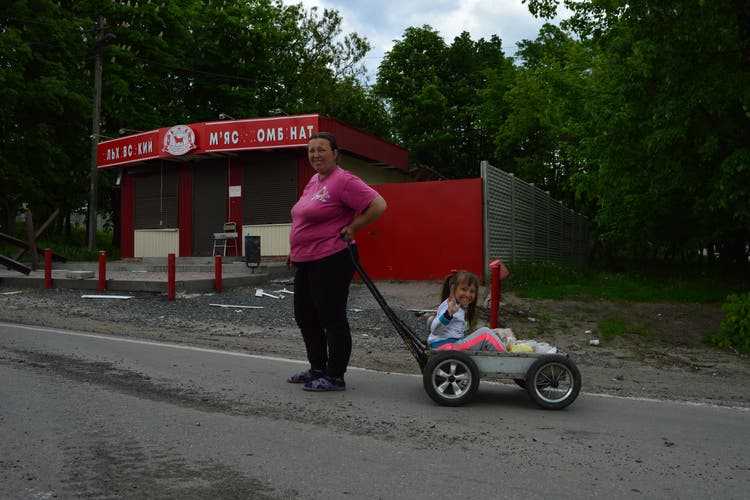
Marina and her daughter received food donations.
Wilchiwka seems like an in-between world: Destruction everywhere, traces of violence everywhere, and yet the people here live on. Broken Russian war equipment stands in the fields and is slowly being overgrown by nature.
A group of five Ukrainian military helicopters flew over the village that afternoon. They’re on their way to the front. This is currently in the village of Ruska Losowa, less than 15 kilometers as the crow flies from Wilchiwka. Ruska Losowa was recaptured just last week, also by special forces from the Azov regiment.
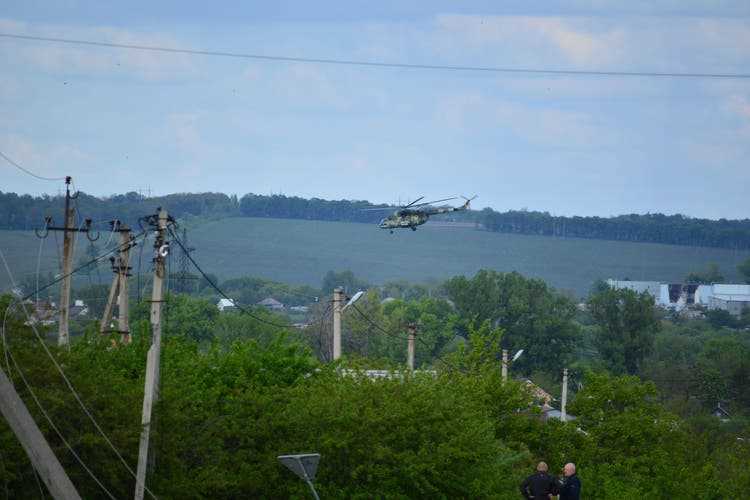
A Ukrainian helicopter over Vikhivka.
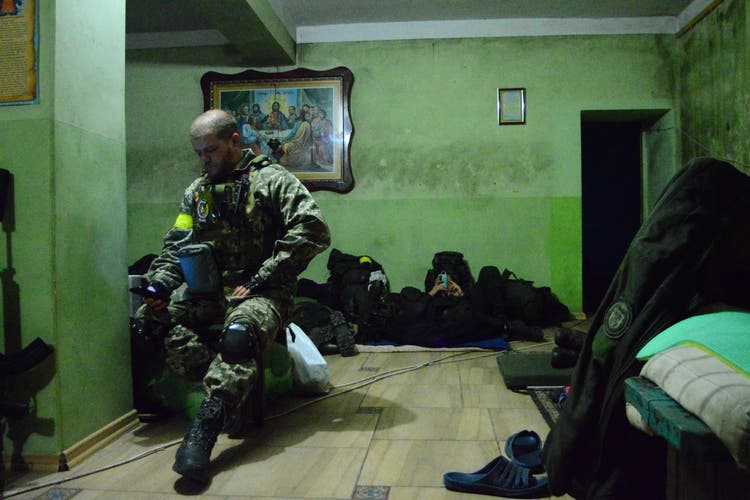
A soldier from the Chartiya Battalion charges his mobile phone in the basement of a church in Ruska Losowa.
Ruska Lozova, on the other hand, is held by the Khartia Battalion, a volunteer force commanded by Vsevolod Kozhemyako. Before the war, the businessman was on the Forbes list of the hundred richest Ukrainians. There was a constant bang in Ruska Losowa, the nearest Russian position was a few kilometers away.
Uniforms of Russian soldiers lie on the ground. The letter “Z” is written in large letters on some cars. It was a symbol of the Russian armed forces at the beginning of the war, but it has now become a propaganda symbol for the invasion.
There are no civilians here. The Chartija fighters have entrenched themselves in the abandoned residential buildings. A soldier explains: “Enemy drones fly here every day. As soon as they spot people, the artillery will be aimed at them. We cannot yet be responsible for allowing civilians to return.” Only now and then did the soldiers pick up a confused alcoholic who absolutely didn’t want to understand the seriousness of the situation and kept coming back, he says.
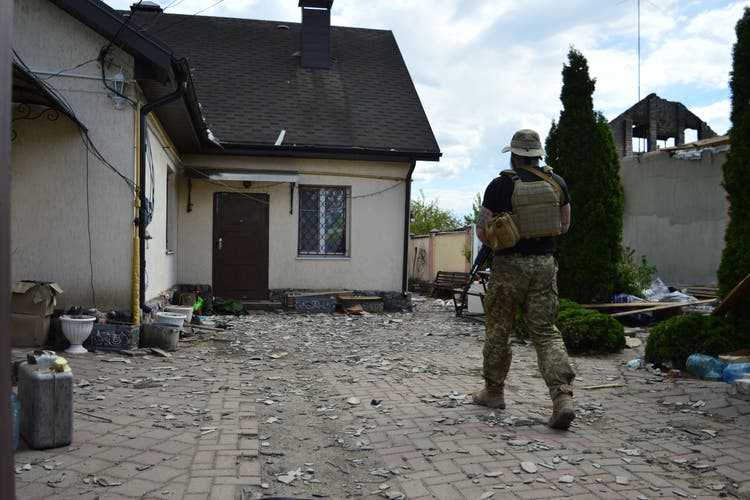
A Ukrainian soldier patrols through Ruska Losowa.
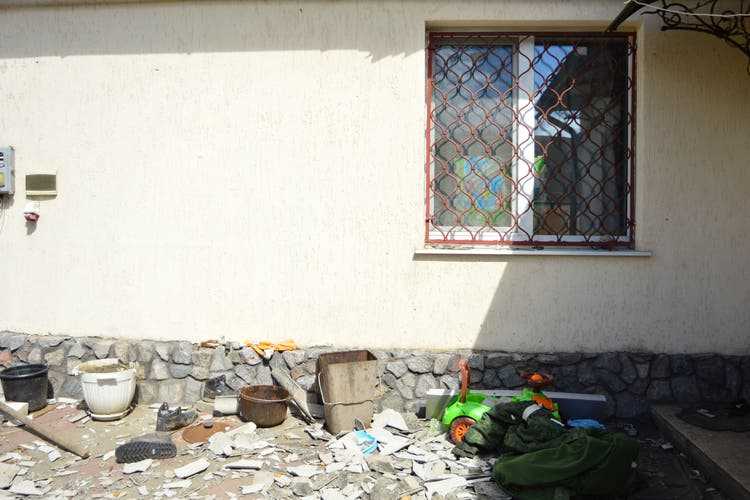
Abandoned dwelling house in the village of Ruska Losowa. A Russian uniform jacket lies on the floor.
The Ukrainians managed to launch a successful counter-offensive around Kharkiv and free the inhabitants. But the war is far from over. Many years ago, Lyuba planted three trees in front of her house: one for her husband Serhi, one for her daughter Lada and one for herself. An impact ripped off a branch of Serhi’s tree. Ljuba hopes and prays every day that this is not a bad omen.
